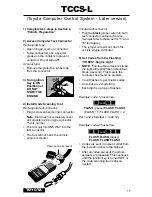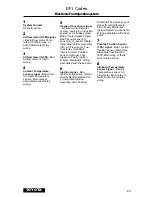
9
C
H
Vehicle Preparation
Important: Complete ALL steps in this section before proceeding to Section 5,
“Reading Trouble Codes.” (Exception: Vehicles with Super Monitor Display – Do steps
1 through 6 only.)
1) Safety First!
• Set the parking brake.
• Put the shift lever in PARK or Neutral.
• Block the drive wheels.
• Make sure the ignition key is in the
OFF position.
2) Vehicle Engine Must be at Normal
Operating Temperature.
• Start engine and let idle until upper
radiator hose is HOT and pressurized
and RPM has settled to warm engine
idle speed.
Warning: Always operate vehicle in
well ventilated area. Exhaust gases
are very poisonous! Observe all safety
precautions (see page 2).
• Turn ignition key to OFF position.
3) Verify: Vehicle Battery Voltage is 11
Volts, or More.
Note that battery voltage will probably be
O.K. (above 11 volts) unless you have
had one of the following conditions:
–
Charging system failure. Is the red
“CHARGE” light (may be labeled with
a small battery picture) illuminated on
the instrument panel while the engine
is running? If you have a voltage
gauge on your instrument panel, is it
indicating low voltage while the engine
is running?
–
Battery sulfation. Internal chemical
damage (sulfation) may occur if the
battery has been sitting for several
months without having been charged.
–
Extensive battery use without the
engine running. Low battery voltage
may be caused by long periods of
cranking a no-start engine or having
electrical accessories (lights, radio) on
for more than 1/2 hour.
Correct any problems in these areas
before proceeding.
4) Verify: Throttle is Fully Closed.
Make sure the accelerator pedal is not
being held open by a fast idle cam
(carbureted engines only), driver foot
pressure, or any other means.
5) Verify: Transmission is in PARK or
Neutral.
6) Verify: All Electrical Systems and
Accessories are Turned OFF.
Also turn off vehicle air conditioner, if
present.
7) Test the “CHECK” Engine Light
(Also called “CHECK ENGINE”, or
labeled with a small engine picture.)
CHECK
• Turn the ignition key from the OFF to
the ON position, but do not start the
engine!
• Verify that the light turns ON.
• If the light does not turn on, you have
a problem with this circuit which must
be repaired before proceeding. Refer
to the vehicle service manual. Some
publications have this information in
books or sections called “Computer-
TOYOTA
Summary of Contents for Code Scanner CP9025
Page 49: ...49 NISSAN...










































